英汉翻译动静态比较以背影为例
汉英翻译学期论文浅析汉英语篇翻译中的句法结构转换—以张培基译注的背影为例 (1)
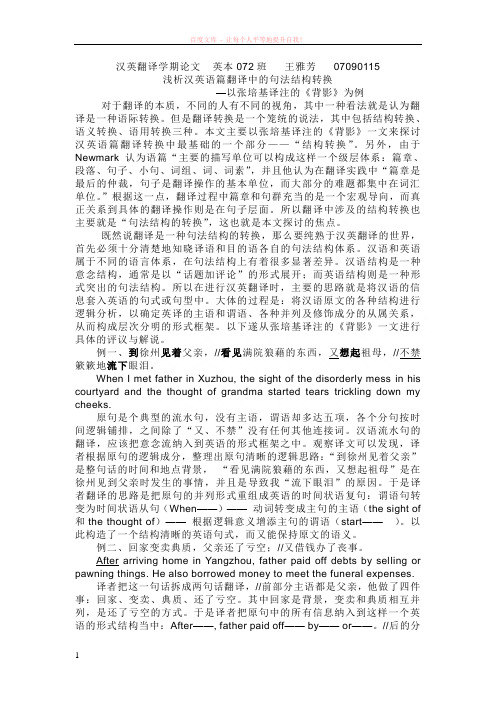
汉英翻译学期论文英本072班王雅芳07090115浅析汉英语篇翻译中的句法结构转换—以张培基译注的《背影》为例对于翻译的本质,不同的人有不同的视角,其中一种看法就是认为翻译是一种语际转换。
但是翻译转换是一个笼统的说法,其中包括结构转换、语义转换、语用转换三种。
本文主要以张培基译注的《背影》一文来探讨汉英语篇翻译转换中最基础的一个部分——“结构转换”。
另外,由于Newmark 认为语篇“主要的描写单位可以构成这样一个级层体系:篇章、段落、句子、小句、词组、词、词素”,并且他认为在翻译实践中“篇章是最后的仲裁,句子是翻译操作的基本单位,而大部分的难题都集中在词汇单位。
”根据这一点,翻译过程中篇章和句群充当的是一个宏观导向,而真正关系到具体的翻译操作则是在句子层面。
所以翻译中涉及的结构转换也主要就是“句法结构的转换”,这也就是本文探讨的焦点。
既然说翻译是一种句法结构的转换,那么要纯熟于汉英翻译的世界,首先必须十分清楚地知晓译语和目的语各自的句法结构体系。
汉语和英语属于不同的语言体系,在句法结构上有着很多显著差异。
汉语结构是一种意念结构,通常是以“话题加评论”的形式展开;而英语结构则是一种形式突出的句法结构。
所以在进行汉英翻译时,主要的思路就是将汉语的信息套入英语的句式或句型中。
大体的过程是:将汉语原文的各种结构进行逻辑分析,以确定英译的主语和谓语、各种并列及修饰成分的从属关系,从而构成层次分明的形式框架。
以下遂从张培基译注的《背影》一文进行具体的评议与解说。
例一、到徐州见着父亲,//看见满院狼藉的东西,又想起祖母,//不禁簌簌地流下眼泪。
When I met father in Xuzhou, the sight of the disorderly mess in his courtyard and the thought of grandma started tears trickling down my cheeks.原句是个典型的流水句,没有主语,谓语却多达五项,各个分句按时间逻辑铺排,之间除了“又、不禁”没有任何其他连接词。
英汉静态与动态对比

试比较:
You are a terrible liar.
你谎话说得太差劲.
His very appearance at any affair proclaims it a triumph
无论什么事情,只要他一露面,就算是成功了。 He admires the President’s stated decision to fight for the job.
英语中,名词化是一种常见的语言现象
英语名词化简单说来即英语偏重使用名词,即所谓“名词 优势于动词”(preponderance of nouns over verbs) 。 英语趋向于用名词来表达原来属于动词 (或形容词) 所表 达的概念。
She succeeded in this match , so she felt encouraged (这次比赛她获胜了,因而很受鼓舞) . 从英语修辞效果上看,它更多是用以下简单句结 构表达: Her success in this match served as great encouragement to her.
A. 由动词的派生词名词(或含有动作意义的 名词)转译为动词
An acquaintance of world history is helpful to the study of translation.
读一点世界史,对学习翻译是有帮助的。
A view of Mt. E-mei can be obtained from here.
汉语中介词使用较少。汉语的介词多数是动词变来的,并 与动词兼类,即介词可以充当句子的谓语,成了动词,即 所谓“反介为动”现象。实际上,这种现象主要是因为汉 语的词性和句法成分不是一一对应的关系。 如,在汉语句子中,“窗户朝南”中“朝”被理解为动词 ,而“窗户朝南开”中,“朝”被理解为介词。现代汉语 有“介词”这一词类,但依然认为“大多数介词是由动词 虚化而来的,因此介词的语法特征还与动词有某些相似之 处”。可见,汉语的介词并不多,即使在某些语境下将之 归类为介词,依然保留着很强的动作性。
英语翻译中的形合意合——以张培基所译朱自清《背影》为例

为 ,所 以”表现 出来 了。然而 ,在 汉语 中,我们也可 以
说: “ 走 累 了 ,休 息 一 下 。 ” 这 句 话 中 , 虽 然 没 有 明 确 连 接 词 表 明相 互 关 系 ,但 通 过 逻 辑 纽 带 ,这 种 关 系 依 然
如演讲中 “ 有时候……有时候…… ” , “ 鸟儿 不 理 我 ,树 也 不理我 。 ”构 成 反 复 结 构 ,英 语 译 文 用 “ s o me t i me s ”“ a t t i me s ” 两个 不 同 的关 联词 巧妙 连 接 。 3 . 3英译汉语 四字词组 中关联词的隐与显 四字词组 具一格 的特 点 ,深刻 反映 出汉语 意合的语言特 是汉语独 征 它 能 形 象 地 表 现 出 丰 富 的蕴 含 和 指 称 意义 充分表现 汉字 的美 感 。在英译 四字格词 组时 ,通 常也要添加关联词 以显现汉语 中隐含的语义关系 。 6 a . 起 初她有些不耐烦,因为在她心 目中,说书人都 是 油 嘴 滑 舌 、不 务 正 业 的人 。
形合 与意合是 英汉两种语 言最大 的差异 。汉 语重意
合
,
汉 语 四字词 组在 “ 诺 贝尔演 讲 ”中 出现 得 比较 多, 葛浩文英译 时采用不 同的策略 。 6 a 中 “ 不务 正业 ”被译成 ‘ 。 i n a d u b i o u s p r o f e s s i o n ” ,运 用 介 词 词 组 , 巧 妙地 与前 面 连 接 起 来 又没 有 丝 毫 牵 强 之意 。又 如 “ 诺 贝尔 演 讲 ” 中文 文本 中, “ 添油加醋 ”被译为 “ e m b e l l i s h i n g m y n a r r a t i o n ” ,没
,
,
朱自清《背影》汉译英翻译
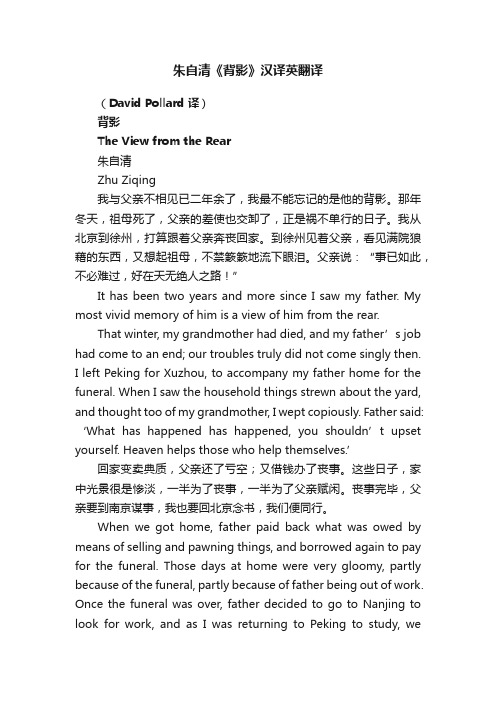
朱自清《背影》汉译英翻译(David Pollard 译)背影The View from the Rear朱自清Zhu Ziqing我与父亲不相见已二年余了,我最不能忘记的是他的背影。
那年冬天,祖母死了,父亲的差使也交卸了,正是祸不单行的日子。
我从北京到徐州,打算跟着父亲奔丧回家。
到徐州见着父亲,看见满院狼藉的东西,又想起祖母,不禁簌簌地流下眼泪。
父亲说:“事已如此,不必难过,好在天无绝人之路!”It has been two years and more since I saw my father. My most vivid memory of him is a view of him from the rear.That wi nter, my grandmother had died, and my father’s job had come to an end; our troubles truly did not come singly then.I left Peking for Xuzhou, to accompany my father home for the funeral. When I saw the household things strewn about the yard, and thought too of my grandmother, I wept copiously. Father said: ‘What has happened has happened, you shouldn’t upset yourself. Heaven helps those who help themselves.’回家变卖典质,父亲还了亏空;又借钱办了丧事。
这些日子,家中光景很是惨淡,一半为了丧事,一半为了父亲赋闲。
丧事完毕,父亲要到南京谋事,我也要回北京念书,我们便同行。
英汉对比静态与动态

英语—静OR动?
1. Admittance Free 免票入场
2. Out of Bounds 游客止步
3. No Admittance Except on Business 闲人免进
4. Danger of Death – High Voltage! 高压危险!
英语-静态STATIVE
4.静态- VERB- WEAKEN
❖动词的弱化:使用动词意味最弱的to be, 包括it be, there be, must be, maybe, should have been
一场热带风暴袭击了佛罗里达东海岸 A tropical storm lashed the east coast of Florida. There was a tropical storm off the east coast of Florida
3.静态-PREPARATION- PROMINENT
❖ 英语常用介词短语代替动词短语,即“以静代动”
1)他们立刻出动去追击敌人。 They immediately set out in pursuit of the enemy. 2)有人给他撑腰。 He has someone behind him. 3)他在读书。 He is at his books. 4)机器正在运行。 The machine is in operation 5) 说完这些话,她便走开了。 With these words, she went away.
静态STATIVE-英语
1.名词化Nominalization 2.施事名词Agentive nouns in place of verbs. 3.介词Preparation- Prominent 4.动词弱化Verbs-weaken 5.形容词与副词Ajectives and adverbs in place of verbs
从张培之英译本《背影》比较英汉语言的异同

ywjszxk@朱自清的《背影》创作于1925年,当时朱自清还在求学阶段。
由于祖母过世,他从北京回到徐州,帮助父亲料理丧事。
那时父亲正处在失业状态,靠变卖家当维持生计。
处理完丧事之后,父亲要去南京谋事,与儿子一道到南京。
面对已经二十岁的儿子,父亲仍将他当作幼儿,要亲自送他上火车,一路上谆谆叮嘱。
儿子临上车,父亲还要去买橘子给儿子带着在路上吃。
他拖着胖胖的身体爬月台,越过铁道,只为了让儿子在路上有橘子吃。
儿子远远看着父亲臃肿的背影,深深被父亲的舐犊之情感动。
这是一篇表现父子亲情的著名作品,语言朴实无华,却情感真切,成为现代文学作品中的经典。
张培之的英译本《背影》抓住了这个特点进行翻译,也成为英译本中的经典。
汉语和英语产生于不同的文化背景,语法差异较大。
英语语法讲究形合,汉语讲究意合;英语在表述时以静态为主,汉语却以动态为主;汉语有隐性表达的习惯,而英语却擅长显性表达;汉语以重复作为修辞,而避免重复是英语的主要句法特征。
张培之在翻译《背影》时,就尽量做到用英语表达方式来表现文章中的父子情。
一、英语的形合和汉语的意合英语和汉语在语言表达上有很大区别,英语注重形合,语言有主次之分,语句具有逻辑性强、连贯的特点;汉语的表达重在意合,语句显得散漫,常常省略主语和句子中的连词。
在翻译中,为了完整表达语言的含义,必须将这些省略的部分补充完整。
原文中有这样一句:“回家变卖典质,父亲还了亏空。
”从语法上分析,这句话缺少主语,应该是“父亲回到扬州的家”,两句话之间还存在逻辑问题,应该是“父亲通过变卖典质,才还清了亏空”。
张培之在英译本中将缺少的主语补上,还调整了语序,使语句变得更加符合逻辑:“The father went back to his home in Yangzhou and paid off the debt by selling his legacy.”(父亲回到扬州家中,用变卖遗产的方式,还清了债务。
背影英译比较
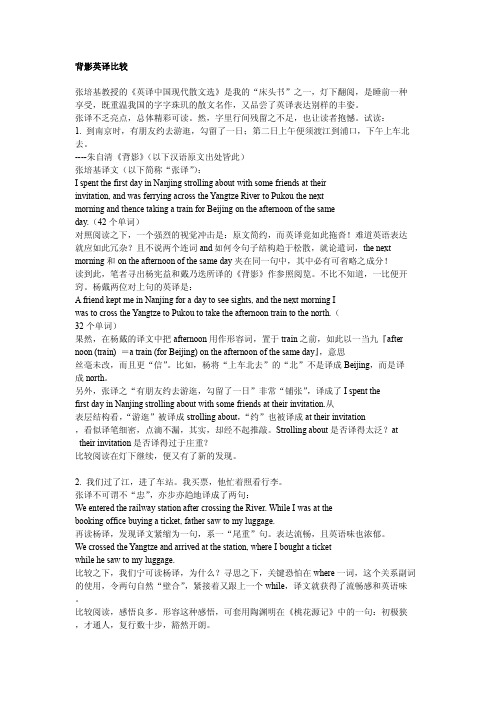
英汉对比静态与动态

5.静态-ADJ&ADV.IN PLACE OF VERBS
❖使用动词的同源形容词与弱化动词相结合的方式表达动词的意义
英汉语言对比 静态与动态
英语—静OR动?
1. Admittance Free 免票入场
2. Out of Bounds 游客止步
3. No Admittance Except on Business 闲人免进
4. Danger of Death – High Voltage! 高压危险!
英语-静态STATIVE
3.静态-PREPARATION- PROMINENT
❖ 英语常用介词短语代替动词短语,即“以静代动”
1)他们立刻出动去追击敌人。 They immediately set out in pursuit of the enemy. 2)有人给他撑腰。 He has someone behind him. 3)他在读书。 He is at his books. 4)机器正在运行。 The machine is in operation 5) 说完这些话,她便走开了。 With these words, she went away.
4.静态- VERB- WEAKEN
❖动词虚化: 把动词转化或派生成名词,置于虚化动词(have, make, take, do)之后做其宾语,如have a look, take a walk, make attempts, pay visits, do some damages, put up a proposal
英汉对比研究 静态与动态

一算 试了一试 A着A着(A了A了):看着看着 走着走着 老了老
•
了 完了完了 AABB式:说说笑笑 来来往往 吃吃喝喝 摇摇
•
晃晃 吵吵闹闹 ABAB式:讨论讨论 学习学习 休息休息 热闹
•
热闹 走动走动 ABAC式:无依无靠 有始有终 任劳任怨 没完
•
没了 敢作敢为
汉语还有大量对偶复意的动词词组,如:
静态与动态 禅茶一味 道在其中 Static vs.Dynamic
走开! Stay away! 别管我! Leave me alone! 他吃素,不吃荤 He is a vegetarian.
她们飞上了蓝天(报纸标题) Women Pilots in China 周阿斗寻父记(文章标题) A Reunion of Father and Son 你老是看钟等着下课啊! Oh! You're a clock-watcher!
佛罗里达东海岸有一场热带风暴。
A tropical storm lashed the east coast of Florida.
一场热带风暴袭击了佛罗里达东海岸。
It was the finding of the committee that
there had been bribes paid by company manager
He is at his books.(=He is reading books)
He has someone behind him. (=Someone supports him)
The machine is in operartion. (=The machine is working.)
Is this train for Chicago? (=Is this train going to Chicago?)
英汉静态与动态对比

英语中,名词化是一种常见的语言现象
英语名词化简单说来即英语偏重使用名词,即所谓“名词 优势于动词”(preponderance of nouns over verbs) 。 英语趋向于用名词来表达原来属于动词 (或形容词) 所表 达的概念。
She succeeded in this match , so she felt encouraged (这次比赛她获胜了,因而很受鼓舞) . 从英语修辞效果上看,它更多是用以下简单句结 构表达: Her success in this match served as great encouragement to her.
他对总统声明为保持其职位而决心奋斗表示钦佩。
英汉对比之静态与动态(Static vs Dynamic)
在汉语里,动词使用频率高,呈现一种动态特征。 而在英语里,名词和介词使用频率高,呈现一种静态。
从语法上看, 英语句子是以动词为中心的。但动词的 使用频率明显低于汉语句子。周志培对三个翻译材料 (邓小平《在武昌、深圳、珠海、上海等地的谈话要 点》及英译文、英国首相撒切尔夫人在中国欢迎宴会 上的讲话及汉译文、美国罗斯福总统第四任就职演说 及汉译文) 进行分析,得出结论: 英语动词在这三个 材料中所占比率分别为14 %、11 %和15 % , 而汉语 动词所占的比率为则33 %、24 %和25 %。
In terms of economic strength India is far behind.
英语在表示方位或状态的时经常使用out﹑on﹑ over﹑ off ﹑back﹑ up ﹑apart 等副词,而汉语在表示这些状态时往往会 使用动词。所以,汉语一些表示方向或方位的状态动词要转译为 英语的副词。例: 这两个工厂相隔两公里。
话语分析模式下的翻译比较--以朱自清《背影》的两种英译文为例
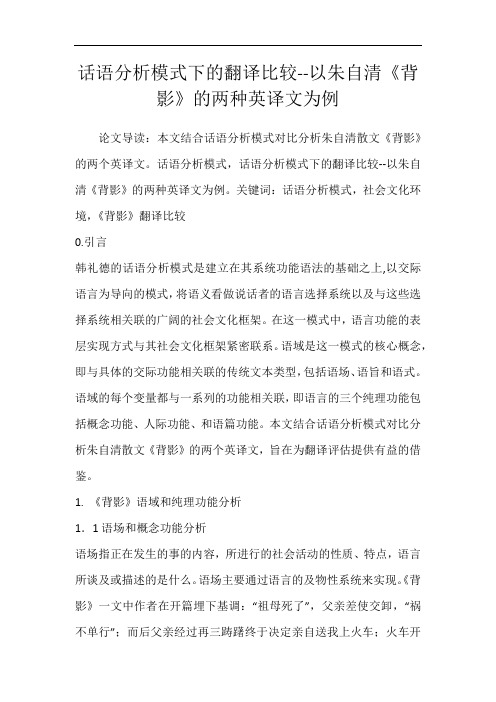
话语分析模式下的翻译比较--以朱自清《背影》的两种英译文为例论文导读:本文结合话语分析模式对比分析朱自清散文《背影》的两个英译文。
话语分析模式,话语分析模式下的翻译比较--以朱自清《背影》的两种英译文为例。
关键词:话语分析模式,社会文化环境,《背影》翻译比较0.引言韩礼德的话语分析模式是建立在其系统功能语法的基础之上,以交际语言为导向的模式,将语义看做说话者的语言选择系统以及与这些选择系统相关联的广阔的社会文化框架。
在这一模式中,语言功能的表层实现方式与其社会文化框架紧密联系。
语域是这一模式的核心概念,即与具体的交际功能相关联的传统文本类型,包括语场、语旨和语式。
语域的每个变量都与一系列的功能相关联,即语言的三个纯理功能包括概念功能、人际功能、和语篇功能。
本文结合话语分析模式对比分析朱自清散文《背影》的两个英译文,旨在为翻译评估提供有益的借鉴。
1. 《背影》语域和纯理功能分析1.1语场和概念功能分析语场指正在发生的事的内容,所进行的社会活动的性质、特点,语言所谈及或描述的是什么。
语场主要通过语言的及物性系统来实现。
《背影》一文中作者在开篇埋下基调:“祖母死了”,父亲差使交卸,“祸不单行”;而后父亲经过再三踌躇终于决定亲自送我上火车;火车开车前艰难地越过铁路为我买橘子,我为之动容而几次流泪。
原文主要运用物质过程,尤其值得关注的是父亲的行为过程和描述作者心理状态的心理过程。
1.2 语旨和人际功能分析语旨指的是文本涉及的交际者,他们的基本情况、特点、地位、角色、关系等。
语旨与人际功能相关,主要通过语气系统和评价系统来体现。
《背影》作者在整个叙事过程中渗透着父子间含蓄深厚的感情。
因为笑父亲的“迂”和认为自己“太聪明”时表达了对父亲的愧疚和对自己的指责,父亲买橘子、读父亲的来信等场景从另一个侧面表达了对父亲感恩和深爱之情。
1.3 语式和语篇功能分析语式指语言在交际中所起的作用,包括交际渠道和修饰方式。
语式与语篇功能相关,主要通过主位-述位结构、信息系统和衔接手段来实现。
《背影》英译本对比赏析
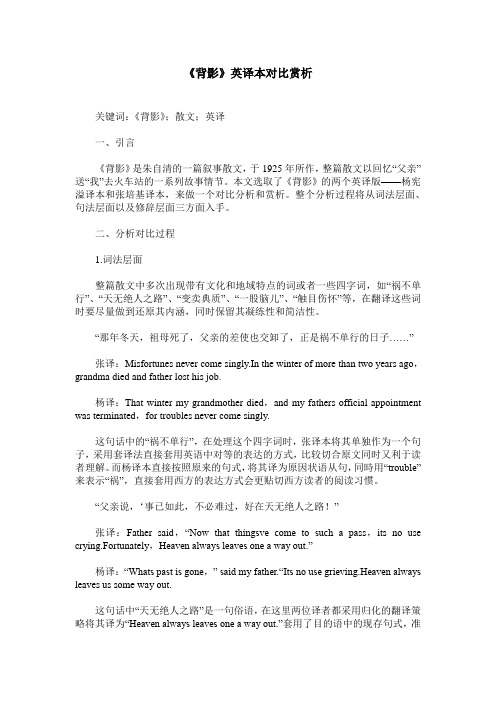
《背影》英译本对比赏析关键词:《背影》;散文;英译一、引言《背影》是朱自清的一篇叙事散文,于1925年所作,整篇散文以回忆“父亲”送“我”去火车站的一系列故事情节。
本文选取了《背影》的两个英译版——杨宪溢译本和张培基译本,来做一个对比分析和赏析。
整个分析过程将从词法层面、句法层面以及修辞层面三方面入手。
二、分析对比过程1.词法层面整篇散文中多次出现带有文化和地域特点的词或者一些四字词,如“祸不单行”、“天无绝人之路”、“变卖典质”、“一股脑儿”、“触目伤怀”等,在翻译这些词时要尽量做到还原其内涵,同时保留其凝练性和简洁性。
“那年冬天,祖母死了,父亲的差使也交卸了,正是祸不单行的日子……”张译:Misfortunes never come singly.In the winter of more than two years ago,grandma died and father lost his job.杨译:That winter my grandmother died,and my fathers official appointment was terminated,for troubles never come singly.这句话中的“祸不单行”,在处理这个四字词时,张译本将其单独作为一个句子,采用套译法直接套用英语中对等的表达的方式,比较切合原文同时又利于读者理解。
而杨译本直接按照原来的句式,将其译为原因状语从句,同時用“trouble”来表示“祸”,直接套用西方的表达方式会更贴切西方读者的阅读习惯。
“父亲说,‘事已如此,不必难过,好在天无绝人之路!”张译:Father said,“Now that thingsve come to such a pa ss,its no use crying.Fortunately,Heaven always leaves one a way out.”杨译:“Whats past is gone,” said my father.“Its no use grieving.Heaven always leaves us some way out.这句话中“天无绝人之路”是一句俗语,在这里两位译者都采用归化的翻译策略将其译为“Heaven always leaves one a way out.”套用了目的语中的现存句式,准确传达了原文的意思,也为我们今后翻译这句话提供了借鉴。
从指称照应认识汉英语篇衔接的差异——以《背影》及其英译本对比
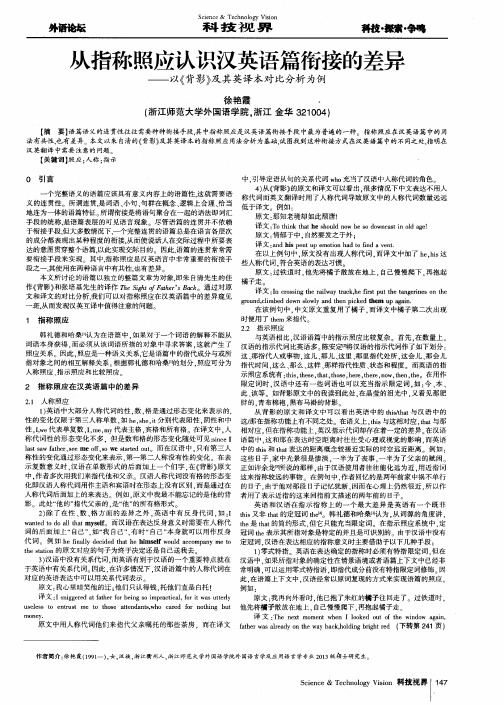
在该 例句中 . 中文 原文重复用 了橘 子 . 而译文 中橘子第 二次出现 时便用 了 t h e m来 指代 2 . 2 指示 照 应 韩 礼德 和哈桑… 认 为在 语篇 中. 如果 对于一个词语 的解 释不能从 与英语相 比, 汉语语篇中的指示 照应比较 复杂 。首先 . 在 数量上 , 词语本 身获得 , 而必须从该 词语所指 的对 象中寻求答案 , 这就产生 了 汉语 的指示代词 比英语多 。 陈安定目 将汉语 的指示代词作 了如下划分 : 照应关 系。因此 , 照应是一种语义关系, 它是语 篇中的指代成分与或所 这 、 那指代人或事物 , 这儿 、 那儿 、 这里 、 那里指代处所 , 这会儿 、 那会 儿 指对象之 间的相互解释关系 。 根据韩礼德和哈桑i 1 的划分 , 照应可分为 指代时 间, 这么 、 那么 、 这样 、 那样指代性质 、 状态 和程度 。而英语 的指 人称照应 、 指示照应和 比较照应。 示照应 系统有 : t h i s , t h e s e , 山a t , t h o s e , h e r e , t h e e, r n O W, t h e n , t h e 。在用作 限定 词时 , 汉 语 中还有 一些词语 也可 以充 当指示限定 词 . 如: 今、 本、 2 指 称 照 应 在 汉 英 语篇 中 的差 异 此、 该等 。如背影原文中的我读到此处 , 在 晶莹 的泪光 中, 又看见那 肥 2 . 1 人 称 照 应 胖 的, 青布棉袍 . 黑布马褂的背影 。 1 ) 英语 中大部分 人称 代词的性 , 数. 格是通过形态变化来 表示 的, 从 背 影 的 原 文 和 译 文 中 可 以 看 出英 语 中 的 t h i s / t h a t 与 汉 语 中 的 性的变化仅 限于第 三人称 单数 , 如h e , s h e , i t 分别代表 阳性 , 阴性 和 中 这 用 在 指 称 功 能 上 有 不 同 之 处 。在 语 义 上 . t h i s 与 这 相 对应 , t h a t 与那 性, I , w e 代表单复数 , I , m e , m y 代表主格 , 宾格和所有格。在译文 中, 人 相对应 。 但在指称功能上 . 英汉指示代词却存在着一定 的差异。 在汉语 称代词性 的形态变化不 多 . 但 是数和格 的形 态变化随处可 见: s i n c e I 语篇 中. 这 和那在 表达时空距离 时往往受心理或视觉 的影响 . 而英语 l a s t s a w f a t h e r 、 s e e me O f 、 S O w e s t a r t e d o u t 。而在汉 语中 . 只有第 三人 中的 t h i s 和t h a t 表达的距离概念较接近实际的时空远近距离 。例如 : 称性 的变化通过形 态变化来表示 . 第一第二人称没有性 的变化 在表 这些 日 子, 家 中光景很 是惨淡 . 一半 为了丧事 , 一半为 了父亲的赋 闲。 示复数意义时 , 汉语在 单数形式的后 面加 上一个们字 , 在《 背影》 原 文 正如许余龙[ 所 说的那样 . 由于汉语使用者往往能化远为近 . 用近指词 中, 作者 多次用 我们来指代他和父亲 汉语人称代词没有格 的形态 变 这来 指称较远 的事物 。在例句 中, 作者 回忆的是两年前家 中祸不单行 化即汉语人称代词用作主语和宾语时在形态上没有区别 . 而是通过在 的 1 3子 . 由于他对那段 1 3子记忆犹新 . 因而在心理上仍然很近 . 所 以作 人称代 词后 面加上 的来表达 例如 . 原文中我最不能忘记 的是他 的背 者用 了表示 近指的这来 回指前文描述的两年前的 日子 影 。此处 “ 他 的” 指代父亲 的. 是“ 他” 的所有格形式。 英 语 和汉语 在指示 指称 上 的一个最 大差 异是 英语 有一 个 既非 2 ) 除 了在性 、 数、 格 方面 的差异 之外 , 英 语 中有反 身 代词 , 如: 1 t h i s 又非 t h a t 的定冠词 t h e t 4  ̄ 。韩礼德 和哈桑 _ l J 认为 , 从词源 的角度讲 . w a n t e d t o d o a l l t h a t my s e l f 而汉语在表达反身 意义时需要在人称代 t h e 是t h a t 的简约形式 , 但它只能充 当限定 词。在指示照应系统中 , 定 词 的后 面加上“ 自己” . 如“ 我 自己” . 有时 “ 自己” 本身就 可以用作反身 冠词 t h e 表示其所指对象是特定 的并且是可识别的 由于汉语 中没有 代词 。例如 h e i f n a l l y d e c i d e d t h a t h e h i ms e l f w o u l d a c c o mp a n y me t o 定冠词 . 汉语在表达相应 的指称意义时主要借 助于以下几种手段 : t h e s t a t i o n的原文对应的句子为终于决 定还是 自已送我去 1 ) 零式特指 。英语在表达确定的指称 时必须 有特指限定词 . 但 在 3 ) 汉语 中没有关系代词 . 而英 语有别 于汉语 的一个重要特点就在 汉语 中. 如果所指对象的确定性在情景语境或者 语篇 上下文中已经非 于英语 中有关系代词 因此 . 在许 多情况下 . 汉语语篇 中的人称代词在 常明确 , 可 以运用零式特指语 , 即指代 成分前 没有特指限定词修饰。 因 对应的英语表达中可以用关 系代词表示 此. 在语篇上下文 中. 汉语经常以原词 复现 的方式来 实现语篇 的照应 原文 : 我心里暗笑他 的迂; 他们 只认得钱 , 托他们直是 白托 ! 例如 ��
汉译英《背影》朱自清

红,张星宇
Who can imagine that he would be so dispirited and downhearted in old age? think that he should now be so downcast in old age!
(2)
例文:To
他触目伤怀,自然情不能自已。
例文:The sad state of affairs of the family drove him to utter despair, and his pent-up emotion had to find a vent.
情郁于中,自然要发之于外;家庭琐屑便往往 触他之怒。他待我渐渐不同往日。
(2)In recent years, both my father and I have
scurried about and the situation of our family got steadily worse.
例文:In recent years, both father and I have been living an unsettled life, and the circumstances of our family going from bad to worse.
他年少外出谋生,独立支持,做了许多大事。
(1) He left home to make a living independently during his early youth and did a lot of great things.
(2) My father went out for a livelihood on his own in his youth , and he did do some great things.
浅析在英汉语言对比与翻译中静态与动态的表现
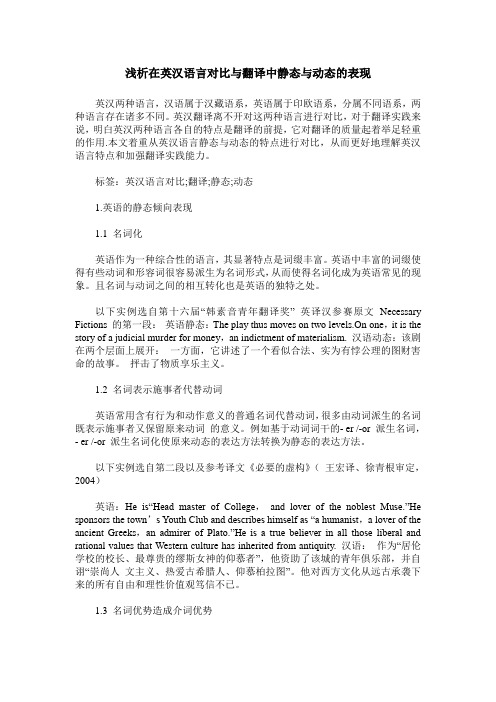
浅析在英汉语言对比与翻译中静态与动态的表现英汉两种语言,汉语属于汉藏语系,英语属于印欧语系,分属不同语系,两种语言存在诸多不同。
英汉翻译离不开对这两种语言进行对比,对于翻译实践来说,明白英汉两种语言各自的特点是翻译的前提,它对翻译的质量起着举足轻重的作用.本文着重从英汉语言静态与动态的特点进行对比,从而更好地理解英汉语言特点和加强翻译实践能力。
标签:英汉语言对比;翻译;静态;动态1.英语的静态倾向表现1.1 名词化英语作为一种综合性的语言,其显著特点是词缀丰富。
英语中丰富的词缀使得有些动词和形容词很容易派生为名词形式,从而使得名词化成为英语常见的现象。
且名词与动词之间的相互转化也是英语的独特之处。
以下实例选自第十六届“韩素音青年翻译奖” 英译汉参赛原文Necessary Fictions 的第一段:英语静态:The play thus moves on two levels.On one,it is the story of a judicial murder for money,an indictment of materialism. 汉语动态:该剧在两个层面上展开:一方面,它讲述了一个看似合法、实为有悖公理的图财害命的故事。
抨击了物质享乐主义。
1.2 名词表示施事者代替动词英语常用含有行为和动作意义的普通名词代替动词,很多由动词派生的名词既表示施事者又保留原来动词的意义。
例如基于动词词干的- er /-or 派生名词,- er /-or 派生名词化使原来动态的表达方法转换为静态的表达方法。
以下实例选自第二段以及参考译文《必要的虚构》(王宏译、徐青根审定,2004)英语:He is“Head master of College,and lover of t he noblest Muse.”He sponsors the town’s Youth Club and describes himself as “a humanist,a lover of the ancient Greeks,an admirer of Plato.”He is a true believer in all those liberal and rational values that Western culture has inherited from antiquity. 汉语:作为“居伦学校的校长、最尊贵的缪斯女神的仰慕者”,他资助了该城的青年俱乐部,并自诩“崇尚人文主义、热爱古希腊人、仰慕柏拉图”。
英汉对比研究-静态与动态

静态与动态 Static vs. Dynamic
What is metaphor? any figurative expression:the transferred sense of a physical word; (词义的转移,如用 “诞生”表示任何事物的起源) the personification of an abstraction;(抽象行为的拟人化,如 “modesty forbids me”的意思是“由于谦虚,我不能”) the applicaton of a word or collocation to what it does not literally denote, i.e., to describe one thing in terms of another.( 用一个单词 或语句表示字面意思之外的意思,如用“cold blood”表示“without feeling or pi purpose of metaphor is basically twofold: referential purpose is to describe a mental process or state, a concept, a person, an object, a quality or an action more comprehensively and concisely than is possible in literal or physical language; pragmatic purpose is to appeal to the senses, to interest, to clarify 'graphically', to please, to delight, to surprise.
英汉语篇连接词的对比与翻译——以《背影》、Insouciance及其译文为例
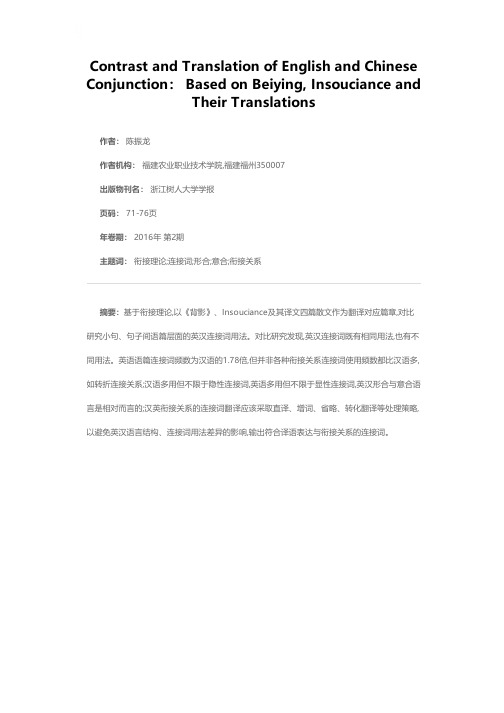
Contrast and Translation of English and Chinese Conjunction: Based on Beiying, Insouciance and
Their Translations
作者: 陈振龙
作者机构: 福建农业职业技术学院,福建福州350007
出版物刊名: 浙江树人大学学报
页码: 71-76页
年卷期: 2016年 第2期
主题词: 衔接理论;连接词;形合;意合;衔接关系
摘要:基于衔接理论,以《背影》、Insouciance及其译文四篇散文作为翻译对应篇章,对比研究小句、句子间语篇层面的英汉连接词用法。
对比研究发现,英汉连接词既有相同用法,也有不同用法。
英语语篇连接词频数为汉语的1.78倍,但并非各种衔接关系连接词使用频数都比汉语多,如转折连接关系;汉语多用但不限于隐性连接词,英语多用但不限于显性连接词,英汉形合与意合语言是相对而言的;汉英衔接关系的连接词翻译应该采取直译、增词、省略、转化翻译等处理策略,以避免英汉语言结构、连接词用法差异的影响,输出符合译语表达与衔接关系的连接词。
- 1、下载文档前请自行甄别文档内容的完整性,平台不提供额外的编辑、内容补充、找答案等附加服务。
- 2、"仅部分预览"的文档,不可在线预览部分如存在完整性等问题,可反馈申请退款(可完整预览的文档不适用该条件!)。
- 3、如文档侵犯您的权益,请联系客服反馈,我们会尽快为您处理(人工客服工作时间:9:00-18:30)。
Stativeness and Dynamicity between Chinese and EnglishA case study of zhang Peizhi's English version of Figure.Generally speaking,a stative language,like English,in order to stress concepts or states ,must rely heavily on nouns and nominal expressions,Such as nouns, prepositions, adjectives, etc.whereas a dynamic language ,like Chinese,which emphasizes motions or actions,would find more expressions in verbs and verbal patterns.This paper will make a comparative study of the static and dynamic characteristics in English-Chinese translation of the original figure and zhang Peizhi's English version of Figure.1. Nominalization is one of the features of English static languageEnglish, especially written language, is highly static and has its own unique preferences in the choice of parts of speech. Nouns are most frequently used in written language. If you us e a verb in a Chinese sentence, use a noun in English1.1 When I met father in Xuzhou, the sight of the disorderly mess in his courtyard and the thought of grandma started tears trickling down my cheeks.到徐州见着父亲,看见满院狼藉的东西,又想起祖母,不禁簌簌地流下眼泪。
1.2 I spent the first day in Nanjing strolling about with some friends at their invitation, and was ferrying across the Yangtse River to Pukou the next morning and thence taking a train Tor Beijing on the afternoon of the same day.到南京时,有朋友约去游逛,勾留了一日;第二日上午便须渡江到浦口,下午上车北去。
In example 1.1 ,“看见” was translated into ” the sight of”,“想到” was translated into ”the thought of” ,“看见” and “想到” were translated into ”sight” and “thought”as nouns in English.But in Chinese ,”sight” and “thought” were verbs in sentence 1.1.In example 1.2,”游逛”is translated into ”at their invitation”.”游逛”was a verb in Chinese,”invitation” is a noun in English.These examples explains the nominalization of English as a static language well. Nouns are used more often than verbs in English sentences.As a dynamic language, Chinese usually uses verbs.2.The frequent use of adjectives is one of the characteristics of English as a static language 2.1 He told me to be watchful on the way and be careful not to catch cold at night.他嘱我路上小心,夜里要警醒些,不要受凉2.2 After the funeral was over, father was to go to Nanjing to look for a job and I was to return to Beijing to study, so we started out together.丧事完毕,父亲要到南京谋事,我也要回北京念书,我们便同行。
In example 2.1,”小心” was translated into “be watchful ”.”不要受凉”means”避免受凉” in Chinese. “不要” was translated into “ be careful not”.In example 2.2,”完毕”was translated into “was over”.”watchful”,”careful” and “over” are adjectives in English.They are used separately instead “小心”,”不要”and “完毕” .In Chinese.It is common to replace Chinese verbs with adjectives in English. This is also one of the characteristics of English as a static language .3.The frequent use of adverbs is one of the characteristics of English as a static language3.1I quickly wiped them away lest he or others should catch me crying.我赶紧拭干了泪。
怕他看见,也怕别人看见。
3.2When I met father in Xuzhou,the sight of the disorderly mess in his courtyard and the thought of grandma started tears trickling down my cheeks.到徐州见着父亲,看见满院狼藉的东西,又想起祖母,不禁簌簌地流下眼泪。
In example 3.1,“拭干眼泪” was translated into “wiped them away”.the word “away” is an adverb.but in Chinese,“拭干”is a verb.In example3.2,”流下眼泪” was translated into “ tears trickling down”.”down” is an adverb in English.In English sentences,Chinese verbs are replaced by adverbs .This is one feature of English as a static language.4.In English-Chinese translation, English verbs are also used to translate Chinese4.1In crossing the railway track, he first put the tangerines on the ground, climbed down slowly and then picked them up again.过铁道时,他先将橘子散放在地上,自己慢慢爬下,再抱起橘子走。
4.2 His hands held onto the upper part of the platform, his legs huddled up and his corpulent body tipped slightly towards the left, obviously making an enormous exertion.用两手攀着上面,两脚再向上缩;他肥胖的身子向左微倾,显出努力的样子。
In example 4.1,”放”,“爬”and“抱”was translated into “ put”,”climbed” and”picked”.And in example 4.2,”攀” ,”缩”and”倾” was translated into “held”,”huddled” and “tipped”.In English,“ put”,”climbed” ,”picked”,“held”,”huddled”and “tipped”are verbs.In example 4.1 and example 4.2.,the Chinese verb was translated using the English verb.The translation of Chinese verbs using English verbs is also one of the characteristics of English as a static language .5.Prepositions are often used to replace Chinese verbs in English translations5.1 Between grandma's funeral and father's unemployment, our family was then in reduced circumstances.这些日子,家中光景很是惨澹,一半为了丧事,一半为了父亲赋闲。
